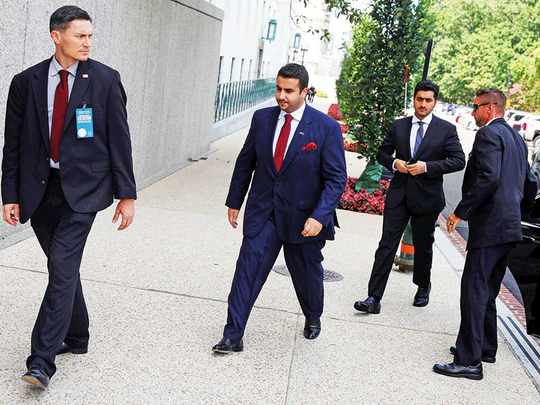
Riyadh: Qatar is falling short in its efforts to counter terrorism, the Arab bloc boycotting the nation has said.
The Arab bloc on Tuesday announced they had blacklisted 18 charity groups and individuals with ties to Yemen, Qatar and Libya, labelling them terrorist over ties to extremist groups.
Saudi Arabia, the United Arab Emirates, Bahrain and Egypt released a joint statement naming nine charity organisations and nine individuals “directly or indirectly linked to Qatari authorities” as terrorist, according to a statement carried by the SPA state news agency.
Three organisations in Yemen and six based in Libya have ties to Al Qaida and a Syrian affiliate of the group, according to the joint statement.
The statement also said three Qatari nationals, three Yemenis, two Libyans and a Kuwaiti citizen were involved in “fund-raising campaigns to support Jabhat Al Nusra and other terrorist militias in Syria”.
The announcement by the four states comes after the end of a trip by Turkish President Recep Tayyip Erdogan to Riyadh, Kuwait and Doha to try to mediate the crisis.
“The terrorist activities of the aforementioned entities and individuals have direct and indirect ties with the Qatari authorities,” the statement said, urging Doha to take “urgent steps and legal actions to persecute terrorist and extremist individuals and entities and especially those on the list”.
Yemen arrests two
In addition, the text warned that the four nations will continue with the current measures and “possible future measures that might be taken”, which they did not specify, unless Doha is “committed to fulfilling all the just demands, which enable the fight against terrorism and maintain security and stability in the region”.
Meanwhile, Yemeni authorities arrested two men blacklisted by the Arab bloc for links with Al Qaida in Hadramout.
Local security sources said elite forces detained Abdullah Mohammad Al Yazidi and Ahmad Ali Ahmad Baraoud.
The four Arab states last month suspended ties with Qatar over allegations the Gulf state bankrolled extremism.
The four states recalled their ambassadors from Doha, banned Qatar from using their airspace and ordered all Qataris to repatriate.
Kuwait is leading mediation efforts to resolve the crisis, the worst to hit the Gulf since the establishment of the Gulf Cooperation Council in 1981.
Saudi Arabia and the UAE lead an Arab military coalition allied with the Yemeni government in a violent war against Yemen’s Iran-backed Al Houthi rebels. The war has killed more than 8,000 civilians since the coalition intervened in 2015, according to the World Health Organisation.
No compromise with Qatar
Meanwhile, Egypt warned the EU yesterday that the four Arab states would accept no compromise in their dispute with Qatar over the country’s support for terrorism.
Foreign Minister Sameh Shoukry, speaking after talks with European Union diplomatic chief Federica Mogherini in Brussels, said Qatar must accept in full the demands by Saudi Arabia, the United Arab Emirates, Egypt and Bahrain.
“It is not an issue of compromise, we cannot compromise with any form of terrorism, we cannot compromise or enter into any form of negotiations,” Shoukry told a press conference.
“It is only once the necessary measures are undertaken by Qatar, that goes toward truly accepting to be a partner in the fight against terrorism, that this crisis will be resolved,” he said.
Shoukry said Qatar was “harbouring elements associated to terrorist ideologies, to radical ideologies, that they have utilised their media outlets to promote and to justify and to glorify terrorist activity.”
The four Arab states have demanded that Qatar stop supporting the Muslim Brotherhood movement, end ties with their regional rival Iran, and close broadcaster Al Jazeera which is inciting unrest in their countries.
Mogherini — who at the weekend met Kuwait’s emir, a key figure involved in trying to mediate the crisis — in turn reiterated calls for talks to resolve the crisis










